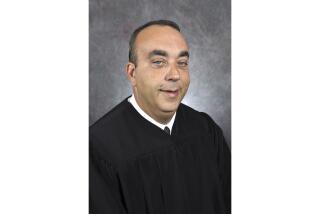Federal judge, a bystander, among the dead
U.S. District Judge John M. Roll, who was killed in the Tucson shooting rampage, appeared to have been an innocent bystander Saturday, but was the target of death threats in 2009 when he emerged as a central figure in Arizona’s bitter disputes over illegal immigration.
Pima County Sheriff Clarence W. Dupnik said Roll, 63, who was a close friend of U.S. Rep. Gabrielle Giffords, had just attended Mass at a nearby church and decided to stop by and say hello. A gunman opened fire, killing six and wounding 12, including Giffords.
“Unfortunately, he was in the wrong place at the wrong time,” said Dupnik, who praised Roll as a brilliant jurist and cherished friend.
Roll’s death is a rare killing among federal judges, the last occurring more than 21 years ago, said David Sellers, a spokesman for the Administrative Office of the U.S. Courts.
Roll became the target of conservative anger two years ago when he ruled that a $32-million civil rights lawsuit filed by illegal immigrants could go to court. The suit was filed against rancher Roger Barnett of Douglas, Ariz., and alleged that he violated the migrants’ rights when he detained at gunpoint those who crossed his property and then turned them over to U.S. Border Patrol agents.
The U.S. Marshals Service put Roll and his wife, Maureen, under 24-hour surveillance after talk-radio accounts of the judge’s role in the case led to hundreds of anonymous threats. A federal investigation identified four people who had lodged threats, but Roll decided against pressing charges, on the advice of the Marshals Service.
“It was unnerving and invasive” being under armed guard, Roll told the Arizona Republic in a July 2009 interview in which he praised the federal protection force.
Roll was named to the federal judiciary in 1991 by President George H.W. Bush. He had been Arizona’s chief federal judge since 2006.
U.S. Supreme Court Chief Justice John G. Roberts Jr. called the killings senseless and said they “inflicted tragic loss on dedicated public servants.”
“We in the judiciary have suffered the terrible loss of one of our own. Chief Judge John Roll was a wise jurist who selflessly served Arizona and the nation with great distinction, as attorney and judge, for more than 35 years,” Roberts said, calling the judge’s death “a somber reminder of the importance of the rule of law and the sacrifices of those who work to secure it.”
U.S. 9th Circuit Court of Appeals Chief Judge Alex Kozinski described Roll in a statement as a “widely respected jurist, a strong and able leader of his court, and a kind, courteous and sincere gentleman. He worked tirelessly to improve the delivery of justice to the people of Arizona.”
Kozinski’s predecessor as 9th Circuit chief, Judge Mary M. Schroeder of Phoenix, said Roll was “famous for being able to say so many genuinely nice things about people without having to consult notes, for he so genuinely loved people and had such a remarkable mind.”
Judge Raner Collins of Tucson is expected to succeed Roll as chief judge for the Arizona district that has 12 active judgeships, three of which are now vacant, the appeals court statement said. Phoenix-based U.S. District Judge Mary H. Murguia was confirmed to a seat on the 9th Circuit last month, and Judge Frank Zapata left for semiretired senior status in August.
President Obama, whose judicial appointments have bogged down in the Senate amid Republican opposition over the last two years, has not yet nominated replacements for Zapata and Murguia, which Kozinski recently said has left the busy Arizona federal court short-handed.
Throughout the 20th century, three federal judges were assassinated. The most recent was in 1989 when Alabama Judge Robert Smith Vance of the U.S. 11th Circuit Court of Appeals was killed by a mail bomb, traced to a man convicted in racially motivated attacks.
In 2005, a man angered by the dismissal of his malpractice case killed the husband and mother of U.S. District Judge Joan Lefkow of Chicago.
Born Feb. 8, 1947, in Pittsburgh, Roll earned his undergraduate and law degrees from the University of Arizona and a doctorate from the University of Virginia School of Law.
Prior to his appointment to the federal bench, he served as a judge of the Pima County Superior Court and on the Arizona Court of Appeals, and had been an assistant U.S. attorney for Arizona.
The judge is survived by his wife, Maureen, three sons and five grandchildren.
More to Read
Sign up for Essential California
The most important California stories and recommendations in your inbox every morning.
You may occasionally receive promotional content from the Los Angeles Times.











